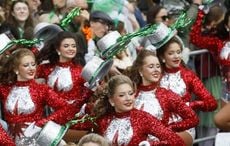For most people, the name Brian Coffey doesn’t mean much. I imagine for most Irish people the name might not mean much either. Even if one knows something about literature, Brian Coffey may still not be a very familiar name.
My first introduction to Coffey was in the late 60s. I discovered a translation he did of Mallarmé’s Un Coup de Dés Jamais N’Abolira Le Hasard or Dice Thrown Never Will Annul Chance. At the time, I was going through a French Symbolist-Surrealist phase which has remained with me ever since, but the book remained one of my favorites. The translation was impeccable in both form and substance and that discovery led me to other works: I recall reading a 1975 article by James Mays in the Irish University Review in which Mays wrote, “Anyone who admires Brian Coffey’s poetry is a member of a minority and must be aware of that fact. The knowledge is disquieting because it makes one ask, frequently at first, if one’s standards have dissolved in some strange enthusiasm. Has one’s mind be taken over by a cult or is one being stubborn into sticking to one’s convictions? Such questions trouble me but, on reflection, I cannot find that I have been misled.” That became apparent to me as well. What I didn’t know at the time, but should have, was Coffey’s relationship to Thomas MacGreevy, Denis Devlin and Beckett (a kind of Irish Gang of Four) and what I had no inkling of at the time, was that Coffey would, eventually, be the person responsible for connecting me to Beckett.
Fast forward to 1977. I had completed my master’s degree in Comparative Literature at Indiana and began working on a novel. In between the decision to advance to a doctoral program or decline into the abyss of a writer’s life, I moved to the Monterey Bay area where I continued working on the book while sending out applications to doctoral programs in the U.S. As a flyer, I applied for an International Institute of Education Scholarship to Oxford. As I recall, it was one of those summer semester programs, but I had always wanted to see what the Oxford experience was like, so it was worth the postage. Apparently, the postage worked and I was awarded a scholarship. At the same time, I was accepted into the doctoral program in Comparative Literature at the University of Minnesota, but since that didn’t begin until the fall, my summer was my own. And so I left for Oxford.
As I recall, I was accepted into Exeter College, off Turl Street, around the corner from the Bodleian. The accommodations were Spartan, but I wasn’t there for the accommodations. I was there for the Oxford experience. I recall I took at least one class with Valentine Cunningham, who was a professor at Corpus Christi College. I think it was a course on Conrad, but that was neither here nor there nor important. What was important was meeting another student who hailed, I think, from Mississippi. For the life of me, I cannot remember his last name, his first was Wellyn I believe, but in the course of our conversations three things became prominent: Django Reinhardt, William Faulkner and Samuel Beckett. Wellyn was very fond of Reinhardt and coming from Mississippi it was axiomatic that he’d be fond of Faulkner. It was a bit like coming from Indiana and talking basketball. He talked about them all the time. As I recall, he certainly seemed more interested in Reinhardt and Faulkner than he did in Oxford and, I think, was there for the same reason I was; namely, the Oxford experience.
I can’t remember how Beckett’s name came up. I think it was because I had this preoccupation with his work and imagined what it might be like to meet him. Wellyn listened intently, but volunteered no information until at some point in our acquaintanceship when he felt as if volunteering some information would not be abused, said to me, “You should talk to my father-in-law.” Which prompted the obvious response, “And that would be?” “Brian Coffey.” I guess one could attribute that meeting to serendipity or to some kind of confluence of cosmic coincidences that a decade after discovering Brian Coffey in Bloomington, Indiana, I’d discover his son-in-law in Oxford. Be that as it may, the opportunity to talk with Coffey was one of those things I couldn’t ignore, especially since I reminded myself of the time, as a graduate student, I hadn’t the courage to introduce myself to Borges in an all-but-empty Bloomington café and tell him how much I admired his work. Carpe diem and all that jazz.
Wellyn actually set up a time when I could speak with Coffey on the phone. To say the least, I was frightfully anxious since Coffey was not only a brilliant translator and poet, but a brilliant mind. Perhaps he recognized my trepidation on the phone since he tried to move the conversation to things I might have been interested in. In that regard, he was much like Beckett. I told him how much I admired his work, how I especially delighted in what he did with Mallarmé, and how I’d like to read more about him. He suggested a correspondence and I thought that was a champion idea especially since it took me off the hook in trying to discuss something with someone who was light years beyond my intellect. In the end, I asked the question I had to ask and that was if he thought there was a way I might be able to meet Beckett sometime in the future (the future being 1980). To that question he merely said something to the effect that he’d send me his [Beckett’s] address and told me to use his name. Needless to say, I was moved and deeply appreciative and, in fact, it was because of Coffey’s graciousness that I eventually met Beckett.
Coffey told me two stories about his association with Hemingway whom he met in Paris. As I recall in the first story, Coffey said he was sitting with two others at Les Deux Magots, one of whom had recently reviewed, and panned, one of Hemingway’s books. I can’t recall what particular year it was or which book it was since it could have been Three Stories and Ten Poems (1923), or In Our Time (1924) (a title slightly plagiarized from Lermontov) or The Torrents of Spring (1926) (a title totally plagiarized from Turgenev) because they were all written in Paris. Regardless, Coffey was sitting at a table where he could see anyone walk into the café and he saw Hemingway walk in apparently in a foul mood. According to Coffey, Hemingway surveyed the café and spotted Coffey with the miscreant reviewer whose back was to the door at which point Papa stormed over to the table. Now, much has been made about how “macho” Hemingway was. Whether he was or wasn’t is open to biographical scrutiny; however, what he did at that moment really gave “machismo” a bad name since without warning he walked up behind the reviewer and coldcocked him. The reviewer fell to the floor and Hemingway stormed out of the café. Moral: be careful about giving your opinion about Hemingway. That made the second story that much more ironic. The second story Coffey told me was also corroborated by Beckett. Of course, Hemingway had no reluctance when it came to offering his literary opinions or any other opinion. One only needs to read his anti-Semitic poem “To a Tragic Poetess” dedicated to Dorothy Parker to appreciate that, but another of his opinions dealt with Joyce’s “Fragments of a Work in Progress” [i.e. Finnegans Wake] to which Hemingway opined something to the effect that people shouldn’t be too hard on Joyce since “Ulysses tired him out.” Curious comment coming from someone who coldcocked a journalist for not liking one of his books. Hemingway stories aside, I was also keenly interested in initiating a correspondence with Coffey and, for a while, I did.
The University of Delaware has Coffey’s correspondence. Alas, any letters from me to him aren’t extant and I don’t have anything I ever wrote to him. However, I kept what he wrote to me and his letters really bespeak of the man’s brilliance and his humanity. We exchanged a number of letters mostly dealing with French literature and, specifically, with the Symbolists. But one letter in particular moved me more than any of the others. It was a transitional time for me when I was at the confluence of deciding what exactly to do with my life (to write OR to teach) and I expressed that anxiety to him. On 14:viii:78 and again on 21:x:78, he wrote me letters, excerpts of which had a major effect on me:
“Dear Mark,
Thank you for your letter. Don’t try to separate human activities into real and non-real ones. Whatever men or women do is real in so far as being what they do. So earning one’s living in a university as lecturer is a real activity which may also be a means to a further end. One is just earning one’s keep by lecturing, which one can do badly, or well or if one attends to the opportunity very well. It is when a person attempts to pull rank or to see themselves not as other men/mss and to expect to be taken as speaking with authority that an element of unreality (=lies) appears.”
And following: “Don’t forget that Dante was both poet and scholar, and that scholarship, scientific study, poetry and statesmanship proceed from the personal centre of a human being, the intelligence preceding the specifications. The only problems that arise are those one makes for oneself and those one sets up barriers and obstacles to the doing and to the making. The imperative of choice disarms, no doubt, but it is choose or die on any plane and slipping into working and then choosing to go on is a good path. The Muses also are a reality.” Hadn’t ever thought of myself in the company of Dante whether in this hell or any other hell, but the point was well taken.
Years lapsed. I returned to the United States, finished my doctorate and took a position at Chapman College in 1990. I wrote to Coffey extending an invitation to come to Chapman which he politely declined. The letter, written on 26:ix:90, only a few months after Beckett’s death, included a poem he wrote titled, “One Way” from the collection Third Person.
“Giving what he has not given
he sees what he has not seen
Taken what he has not taken
he hears what he has not heard
No worst fear
no best fight
constraint constrained
to work himself out”
At the bottom of the page he wrote, “poem, written in 1937, with S.B. in mind, is a kind of pre-view of the man to come. He was a faithful friend. From our first meeting, in 1935, to the end. R.I.P.”
Alas, I never met Coffey. It was one of those encounters that never happened and that one regrets not happening and when he died I felt that I had missed yet another moment in time that could never be regained. All I had to remember were the phone conversations and the voice from his letters, which I return to frequently as a measure of his insight, his intellect and the gentle measure of his hand.
Brian Coffey was born in Dublin in 1905 and died in 1995. He entered University College Dublin in 1924, earning advanced degrees in mathematics, physics, and chemistry. He spent a number of years in Paris, where he became friends with such writers as Denis Devlin, Thomas MacGreevy, Ernest Hemingway and Samuel Beckett.
Mark Axelrod is a professor of Comparative Literature & Creative Writing at Chapman University, Orange, California, and a multiple award winner for his screenwriting and fiction.




Comments